Featured Posts

- Index of Psychological Studies of Presidents and Other Leaders Conducted at the Unit for the Study of Personality in Politics
- The Personality Profile of U.S. Supreme Court Associate Justice Brett Kavanaugh
- The Leadership Style of North Korean Leader Kim Jong-un
- North Korea Threat Assessment: The Psychological Profile of Kim Jong-un
- Russia Threat Assessment: Psychological Profile of Vladimir Putin
- The Personality Profile of 2016 Republican Presidential Candidate Donald Trump
- Donald Trump's Narcissism Is Not the Main Issue
- New Website on the Psychology of Politics
- Unit for the Study of Personality in Politics --- 'Media Tipsheet'
categories

- Afghanistan (228)
- Al Gore (2)
- Amy Klobuchar (4)
- Ayman al-Zawahiri (7)
- Barack Obama (60)
- Ben Carson (2)
- Bernie Sanders (7)
- Beto O'Rourke (3)
- Bill Clinton (4)
- Bob Dole (2)
- Campaign log (109)
- Chris Christie (2)
- Chuck Hagel (7)
- Criminal profiles (8)
- Dick Cheney (11)
- Domestic resistance movements (21)
- Donald Trump (31)
- Economy (33)
- Elizabeth Warren (4)
- Environment (24)
- George H. W. Bush (1)
- George W. Bush (21)
- Hillary Clinton (9)
- Immigration (39)
- Iran (43)
- Iraq (258)
- Jeb Bush (3)
- Joe Biden (13)
- John Edwards (2)
- John Kasich (2)
- John Kerry (1)
- John McCain (7)
- Kamala Harris (5)
- Kim Jong-il (3)
- Kim Jong-un (11)
- Law enforcement (25)
- Libya (18)
- Mahmoud Ahmadinejad (6)
- Marco Rubio (2)
- Michael Bloomberg (1)
- Michele Bachmann (173)
- Mike Pence (3)
- Military casualties (234)
- Missing person cases (37)
- Mitt Romney (13)
- Muqtada al-Sadr (10)
- Muslim Brotherhood (6)
- National security (16)
- Nelson Mandela (4)
- News (5)
- North Korea (36)
- Osama bin Laden (19)
- Pakistan (49)
- Personal log (25)
- Pete Buttigieg (4)
- Presidential candidates (19)
- Religious persecution (11)
- Rick Perry (3)
- Rick Santorum (2)
- Robert Mugabe (2)
- Rudy Giuliani (4)
- Russia (7)
- Sarah Palin (7)
- Scott Walker (2)
- Somalia (20)
- Supreme Court (4)
- Syria (5)
- Ted Cruz (4)
- Terrorism (65)
- Tim Pawlenty (8)
- Tom Horner (14)
- Tributes (40)
- Uncategorized (50)
- Vladimir Putin (4)
- Xi Jinping (2)
- Yemen (24)
Links

archives

- November 2021
- January 2021
- November 2020
- October 2020
- September 2020
- August 2020
- July 2020
- April 2020
- March 2020
- February 2020
- January 2020
- December 2019
- October 2019
- July 2019
- May 2019
- April 2019
- March 2019
- February 2019
- January 2019
- December 2018
- September 2018
- August 2018
- July 2018
- June 2018
- April 2018
- March 2018
- February 2018
- January 2018
- August 2017
- July 2017
- June 2017
- May 2017
- April 2017
- February 2017
- January 2017
- December 2016
- November 2016
- October 2016
- September 2016
- August 2016
- July 2016
- June 2016
- May 2016
- April 2016
- March 2016
- February 2016
- January 2016
- December 2015
- November 2015
- October 2015
- September 2015
- August 2015
- July 2015
- June 2015
- May 2015
- April 2015
- March 2015
- February 2015
- January 2015
- December 2014
- November 2014
- October 2014
- September 2014
- August 2014
- July 2014
- June 2014
- May 2014
- April 2014
- March 2014
- February 2014
- January 2014
- December 2013
- November 2013
- October 2013
- September 2013
- August 2013
- July 2013
- June 2013
- May 2013
- April 2013
- March 2013
- February 2013
- January 2013
- December 2012
- November 2012
- October 2012
- September 2012
- August 2012
- July 2012
- June 2012
- May 2012
- April 2012
- March 2012
- February 2012
- January 2012
- December 2011
- November 2011
- October 2011
- September 2011
- August 2011
- July 2011
- June 2011
- May 2011
- April 2011
- March 2011
- February 2011
- January 2011
- December 2010
- November 2010
- October 2010
- September 2010
- August 2010
- July 2010
- June 2010
- May 2010
- April 2010
- March 2010
- February 2010
- January 2010
- December 2009
- November 2009
- October 2009
- September 2009
- August 2009
- July 2009
- June 2009
- May 2009
- April 2009
- March 2009
- February 2009
- January 2009
- December 2008
- November 2008
- October 2008
- September 2008
- August 2008
- July 2008
meta

Updated August 18, 2011
Rep. Michele Bachmann (R-Minn.) ran her 2008 reelection campaign almost solely on the issue of high gasoline prices and a promise to bring back $2 gas. Now, in her campaign for the Republican nomination for president, Bachmann is recycling that very issue (scroll down for more information).
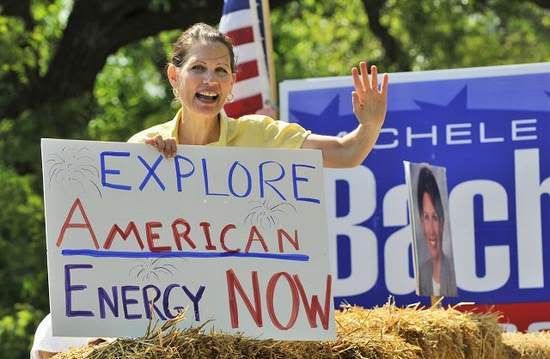
Rep. Michele Bachmann (R-Minn.) at the Sartell SummerFest Parade, Saturday, June 14, 2008, promising a return of $2 gas with a “Drill Here, Drill Now” strategy of increasing supply. (Photo credit: St. Cloud Times)
———
Why Falling Gas Prices Could Be Bad News
Crude in free-fall, shedding two-third of its value since July
Strapped consumers see falling prices as bit of welcome relief. But some economists warn of the growing risk of a ruinous downward spiral called deflation. Here’s what’s at stake.

Justin Sullivan / Getty Images
![]()
Nov. 21, 2008
HOUSTON — Only four months after peaking at an unheard of $4.11 a gallon, the national average price for gasoline tumbled below $2 Friday, its lowest point in more than three years. Yet the global economic contrast between then and now could not be more stark.
On March 9, 2005, the last time gasoline cost less than $2, the Dow Jones Industrial Average closed at 10,805.63. After a huge rally Friday, the Dow closed at 8,046.42.
There was muted joy for consumers wading through an economy that’s almost certainly in recession, with thousands of jobs being lost and mortgage foreclosures continuing to rise to record levels.
On the New York Mercantile Exchange, where oil futures seemed destined to breach $200 a barrel just a few months ago, pessimism was an understatement.
“At this point, all we can say with any degree of confidence is that crude oil … will not trade below zero,” trader and analyst Stephen Schork said Friday in a tongue-in-cheek analysis of the markets swoon.
Crude has been in free-fall, shedding two-thirds of its value since July, and gasoline prices have followed. Some say oil could be headed below $40 a barrel, and gasoline below $1.50.
Motorists in Independence, Mo., on Friday said they were paying $1.37 for a gallon of gas. …
“Its impossible to know exactly how low the price of gasoline will eventually go,” AAA spokesman Geoff Sundstrom said Friday. “Households can, however, reasonably anticipate that lower fuel prices will be the norm throughout the rest of this year and probably into early 2009.”
The Federal Highway Administration reported this week that Americans drove 10.7 billion fewer miles in September than a year ago, the 11th straight monthly decline.
But there’s some evidence that motorists may be heading back to the pump in greater numbers as gasoline prices fall.
MasterCard SpendingPulse reported Tuesday that even though gas consumption last week was down 2.8 percent from a year ago, it was the smallest year-over-year decline in more than two months. …
For traders, there have been only a few good weeks on the New York Mercantile Exchange since crude peaked on July 11, and the past week was particularly bad. … On Thursday, crude fell to levels not seen in three years. …
OPEC lowered production quotas by 1.5 million barrels a day last month, and some analysts predict even lower levels to come out of the cartel’s next official meeting Dec. 17. …
Oil prices have been crushed as the global economic downturn has diminished demand. How low prices can go is anyone’s guess.
“Do not trust anyone in this market who tries to convince you that oil cannot go below $40,” Schork said in his report Friday. “The same way no one had a clue how high prices could go last July, there is no telling how low we can go now.”
![]() Video
Video
Gas prices tanking (NBC Nightly News, Nov. 21, 2008) – Lower gas prices may be giving American drivers a financial reprieve, but they’re a symptom of a very sick global economy. Tom Costello reports. (02:04)
———
12/5/08 Update
Return to $1 Gas? Energy Prices Evaporate

![]()
Dec. 5, 2008
Oil prices hit four-year lows Friday as employers cut the highest number of jobs in 34 years. The continuing decline in prices is so dramatic and so sudden that it is raising the prospect that gas prices could soon fall below $1 a gallon.
The worst jobs data in 34 years on Friday just added more fuel to the deepening global recession as U.S. employers slashed a far worse-than-expected 533,000 jobs in November and the unemployment rate rose to a 15-year high of 6.7 percent. …
———
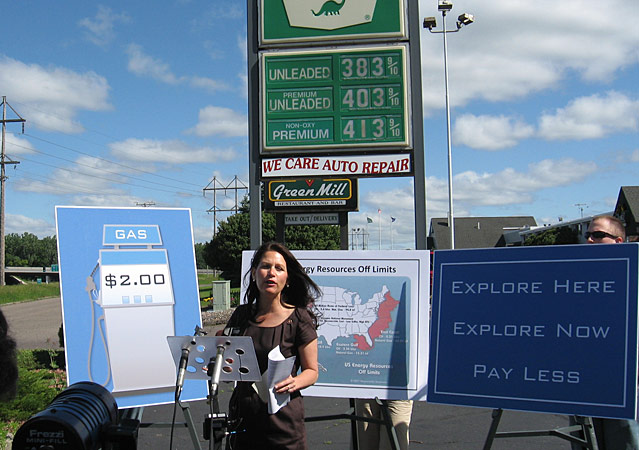
Rep. Michele Bachmann (R-Minn.) at the Sinclair service station on Century Ave., Woodbury, June 16, 2008, using charts to explain her plan to bring down the price of gasoline to $2 by increased drilling, including offshore drilling and drilling in the Arctic National Wildlife Refuge. (Photo credit: Mark Zdechlik / MPR)
By Michele Bachmann
Townhall.com
Oct. 29, 2008
Driving through the district today, gas station after gas station displayed gas prices around the $2 mark. The lowest price I saw today was $2.06 in Elk River. It seems like only yesterday papers and pundits in my district and around the country were mocking the mere notion of $2 gas — but here we are.
What happened the past few months to lower the cost of gas? Several things, but perhaps most importantly, Congress has let the ban on offshore oil exploration and oil shale expire, sending a signal to the markets that the United States may finally be ready to up their supply. …
![]() Video update
Video update
Gulf CEO: Gas may get back to $1 per gallon (CNBC, Dec. 5, 2008) — Gulf Oil CEO Joe Petrowski tells CNBC’s Melissa Lee that 2009 may bring the return of one dollar per gallon gas. (06:21)
———
Bachmann Says More Drilling Will Bring Down the Cost of Gas
As gasoline prices continue to soar, 6th District U.S. Rep. Michele Bachmann says she has a plan to get back to $2 a gallon. Bachmann, who’s running for re-election to a second term, outlined a strategy Monday to lower gas prices by expanding domestic oil exploration and production. But Bachmann’s chief political rival says the election-year promise is based on bad policy.
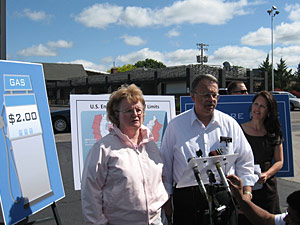
Diane and Gary Baran of Woodbury, standing with Rep. Michele Bachmann, said they are concerned about gas prices. Bachmann called for more domestic oil exploration and production Monday, June 16, 2008. (Photo credit: Mark Zdechlik / MPR)
Minnesota Public Radio
June 16, 2008
St. Paul, Minn. — The national average for a gallon of gas is just over $4. The price at the pump was $3.83 at the Sinclair station on Century Ave. in Woodbury, where Bachmann stood with charts and explained her plan to give motorists a break.
“It is the No. 1 issue that I hear from constituents of mine all across the 6th Congressional District,” she said. “I think it’s safe to say for the bulk of my colleagues as well, they are hearing from their constituents that they’re being negatively impacted by the high cost of energy.”
Bachmann is backing a Republican proposal to address high gas prices, called the No More Excuses Energy Act. The plan would increase the nation’s oil refining capacity and open up drilling in the Arctic National Wildlife Refuge in Alaska.
Bachmann also wants additional oil and gas exploration, more nuclear power facilities and expanded tax credits for alternative fuels.
Bachmann said her $2 a gallon goal would take a few years to reach. But she said passage of the measures would have an immediate impact on prices.
“One thing we need to do is send a signal to the market that the United States is serious about exploring its own resources,” Bachmann said. “The minute we make that announcement and begin to explore American resources, we will see prices start to fall. Because people who purchase energy contract futures get the signal that America is actually going to increase its source of supply.”
Bachmann describes the GOP plan as a common sense approach.
The Democrat who wants to win her congressional seat this fall said the plan is inadequate and shortsighted.
DFLer Elwyn Tinklenberg said he supports additional domestic oil exploration as part of a broad energy plan. But he said more drilling, including in ANWR, would offer only a short-term, stopgap solution. …
Tinklenberg, a former state transportation commissioner, said he doesn’t think a return to $2 gas is possible unless there’s a significant drop in oil consumption.
His energy plan calls for the development of a more efficient transportation system, higher mileage vehicles, alternative fuels and greater conservation.
A recent federal report also raises questions about the price impact of tapping new Alaska oil.
The U.S. Energy Information Administration concluded last month that drilling in ANWR would at best lower the price of a $130 barrel of oil by $1.44. The report said the reduction could also be as small as 41 cents per barrel.
———
Bachmann Oil Drilling Plan Draws Skepticism
The high price of gasoline has become a major pain for consumers this summer and a major campaign theme for politicians. Sixth District Republican Rep. Michele Bachmann insists gas prices would drop significantly if oil companies could drill in Alaska’s Arctic National Wildlife Refuge. But even some of her fellow Republicans question that approach.
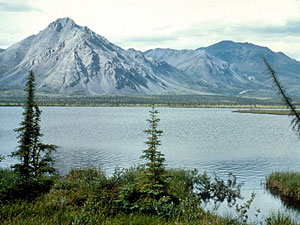
This undated photo shows the Arctic National Wildlife Refuge in Alaska. (Photo credit: U.S. Fish and Wildlife Service / Getty Images)
By Tim Pugmire
Minnesota Public Radio
July 22, 2008
St. Paul, Minn. — Michele Bachmann returned from a weekend tour of the Arctic National Wildlife Refuge even more committed to the idea of drilling for oil there.
She shared her experience first with the National Review, writing that ANWR is a treasure trove of energy. Bachmann repeated the message during an appearance on Fox News. During the brief television interview, Bachmann described ANWR as a perfect place for oil drilling.
“It’s perfectly situated because it’s adjacent to the current Trans-Alaska pipeline,” she said. “This is our energy lifeline for the United States. It’s over 800 miles of pipeline. This is only 74 miles away. It would be relatively simple to build a spur line.”
Bachmann is backing a GOP proposal that would open up oil drilling in Alaska, the nation’s coastal waters and other closed areas.
She also favors increasing oil refining capacity, expanding natural gas exploration, building more nuclear power plants and extending tax credits for alternative fuels.
Bachmann has even claimed the overall strategy to boost energy production could bring back $2 a gallon gas.
But much of the first-term Republican’s attention is on ANWR. During a conference call with reporters, Bachmann said oil drilling could be done in a small area with minimal environmental impact.
“This has not been repelling wildlife. This has been a situation where wildlife actually coexists very well, and in fact in some ways, you may say is enhanced,” Bachmann said. “We were told how dramatically the caribou herd has even increased since inputting the pipeline 31 years ago.” …
ANWR drilling is a divisive issue, even among Republicans. Presidential candidate John McCain favors a hands-off approach there. So does Minnesota Sen. Norm Coleman. Coleman said he supports an increase in domestic oil exploration, but not everywhere. He said ANWR drilling is unrealistic. …
Environmentalists and other critics also question Bachmann’s claim that ANWR drilling could soon reduce pump prices.
They cite a recent analysis from the U.S. Energy Information Administration that concluded oil drilling there would take more than a decade to develop.
The agency also estimates the added supply would lower the price of a barrel of oil by no better than $1.44, which means the reduction of the price of a gallon of gasoline would be far less.
Bachmann is running for re-election to a second term. Her DFL opponent, Elwyn Tinklenberg, said he also supports more domestic oil exploration as part of a broader strategy that also lowers oil consumption. But Tinklenberg said Bachmann’s pledge of $2 a gallon gas isn’t realistic.
———
6/10/10 Update
Poll: Support Plunges for Offshore Drilling; Regulators Blamed for Gulf Spill
By Juliet Eilperin and Jon Cohen
![]()
June 10, 2010
Just a quarter of Americans back expanding offshore drilling in the wake of the BP oil spill, and most fault federal regulators for the environmental disaster in the Gulf of Mexico, according to a new Washington Post-ABC News poll.
Before the spill, the Obama administration lifted the moratorium on drilling in U.S. coastal waters as a way to address the country’s energy needs. But most Americans now want fewer offshore wells (31 percent) or the amount kept at current levels (41 percent).
Perhaps as a consequence of the spill, public support for oil and gas drilling in general is also significantly lower than it was a year ago. And as Americans have become increasingly skeptical about such exploration, some elected representatives are now questioning what the government is doing to ensure that offshore exploration can take place safely. …
The new Post-ABC poll reveals a widespread perception that poor federal regulation was at fault in the gulf spill. About 63 percent point a finger at inadequate enforcement of regulations, and 55 percent see an overall weak regulatory structure. Even more, 73 percent, blame BP and its drilling partners for the accident. And the same number are calling the spill a major environmental disaster. …
The broad concern about government inaction directly relates to public support for new drilling: Those who see a weak regulatory structure as a reason for the spill are about twice as likely to want to curb offshore drilling than are those who don’t see the need for stricter federal controls.
About half of the poll respondents, 49 percent, now see the gulf spill as part of a broader problem with such drilling. Support for drilling in general has slipped from 64 percent last August to 52 percent now.
The Post-ABC poll was conducted June 3 to 6 [2010], among a random national sample of 1,004 adults. The results from the full poll have a margin of sampling error of plus or minus three percentage points.
———
8/18/11 Update
Bachmann: I’ll Bring Back $2 Gas
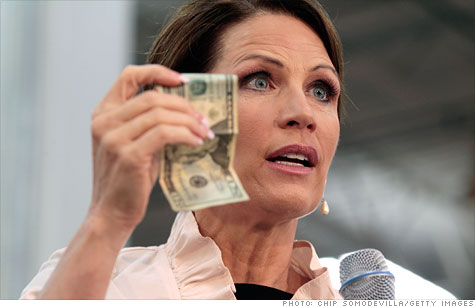
GOP presidential hopeful Michele Bachmann blamed President Obama for increasing gas prices and said she would change that. (Photo credit: Somodevilla / Getty Images via CNN.com)
By Charles Riley
![]()
August 18, 2011
NEW YORK (CNNMoney) — President Michele Bachmann has a promise: $2 gas.
“Under President Bachmann you will see gasoline come down below $2 a gallon again,” Bachmann told a crowd Tuesday in South Carolina. “That will happen.”
Sure, politicians promise all kinds of things on the campaign trail. But Bachmann, a leading contender for the 2012 Republican nomination, is wading into truly tricky territory.
The price Americans pay at the pump is tied to the crude oil market — a global system largely beyond the reach of Washington. …
“The day that the president became president gasoline was $1.79 a gallon,” Bachmann said. “Look what it is today.”
Of course, that’s not the full story.
When Obama took office, the country was mired in a terrible economic contraction.
“That was in the 4th inning of the greatest recession of our lifetime,” said Tom Kloza, chief oil analyst at the Oil Price Information Service.
During recessions, demand for gasoline plummets as trucks pull off the road, companies cut back on travel and laid off workers drive fewer miles.
“You have to be careful what you wish for because the recipe for cheap prices these days is economic disaster,” Kloza said. …
“We’re going to have to recognize the rest of the world has this increasing appetite for oil,” he said. “If we go below $2 a gallon, it probably means there has been a lot of wealth loss and we are in a deflationary period.” …
Bachmann did not lay out a specific plan to drop prices on Tuesday. But her campaign website says that as president, she would ease restrictions on drilling and roll back federal regulations on the shale gas industry.
Drill baby drill won’t lower gas prices
While increased oil and gas drilling in the United States may create good-paying jobs, reduce reliance on foreign oil and lower the trade deficit, it would have little impact on gas and oil prices.
That’s because the amount of extra oil that could be produced from more drilling in this country is tiny compared to what the country — and the world — consumes.
Plus, any extra oil the United States did produce would likely be quickly offset by a cut in OPEC production. …
Read the full story at CNN Money
———
8/24/11 Update
On the Aug. 23, 2011 edition of “Reality Check†on WCCO 4 News at 10, political reporter Pat Kessler fact-checked Rep. Michele Bachmann’s claim that under a President Bachmann, the price of gasoline will drop below two dollars.
Reality Check: Bachmann’s $2 Gas Claims

Pat Kessler reporting on WCCO
August 23, 2011
ST. PAUL (WCCO) — Minnesota Rep. Michele Bachmann’s pledge to bring back $2 gas has the feel of a “chicken in every pot†political promise. Experts say claims like this are running on empty.
“Under President Bachmann, you will see gasoline prices come down below $2 a gallon again!†said Bachmann, campaigning for the 2012 GOP presidential nomination in South Carolina last week. “That! Will! Happen!â€
That statement is highly QUESTIONABLE.
Bachmann says cheaper gas is doable if the US expands domestic drilling from Alaska to offshore. However, even if the US changed its drilling policy immediately, it wouldn’t lower gas prices for many years.
The Energy Information Administration estimates it would be 2030 before there would have a significant impact on the price at the pump.
Promising cheaper gas is a political strategy Bachmann has used before in Minnesota political campaigns.
“This is our goal: to get back to $2 a gallon, †Bachmann said in June 2008, while running for Congress.
Here’s what you NEED TO KNOW.
Back then, Bachmann called it the “No More Excuses Energy Act†and, like her campaign for president this year, she promised $2 gasoline within 4 years.
“In order to get back to $2 a gallon, there is only one solution. It’s to explore here, and explore now, so Minnesotans can pay less,†she said.
Bachmann blames President Obama for high gas prices, which oil experts say is simply not true for Obama, or any president.
It’s worth noting that in this political season there’s a history of Democrats blaming Republicans for gas price hikes, too.
Now, gas prices are averaging about $3.50. When Obama took office at the deepest point of the recession, prices were at $1.79. That’s when oil experts say demand for gasoline plummeted, and prices dropped.
![]() Watch video: Bachmann Aims to Lower Gas Prices If Elected (02:32)
Watch video: Bachmann Aims to Lower Gas Prices If Elected (02:32)
You might also be interested in reading:
CNN Money: Bachmann gas prices
Factcheck.org: Playing politics with gasoline prices
Factcheck.org: Is Obama to blame for $4 gasoline?
Leave a Reply
You must be logged in to post a comment.



June 3rd, 2009 at 3:48 am
[…] $2 Gas? Bad News. (Nov. 22, 2008) […]
August 12th, 2009 at 1:37 pm
[…] Aubrey Immelman in Salida, between Becker and Big Lake at Highway 10 and County Route 11 to Santiago and Monticello, at the end of the second leg of his 100-mile Sixth District walking tour, Aug. 11, 2008. […]
November 22nd, 2009 at 11:12 pm
[…] $2 Gas? Bad News. […]
June 7th, 2010 at 9:55 pm
[…] $2 Gas? Bad News. (November 22, 2008) […]
June 8th, 2010 at 9:28 pm
[…] $2 Gas? Bad News. (Nov. 22, 2008) […]
August 6th, 2010 at 12:44 pm
[…] In recent weeks, Bachmann has also been extremely visible on energy issues, urging Congress to open up oil- and gas-drilling opportunities to ease prices for consumers. […]
November 23rd, 2010 at 4:03 am
[…] $2 Gas? Bad News. […]
April 13th, 2012 at 5:06 am
Aubrey Immelman commented on St. Cloud Times letter to the editor “Bachmann wrong about gas prices” at http://www.sctimes.com/article/20120413/OPINION/304130003/Letter-Bachmann-wrong-about-gas-prices/
From the letter: “… gas was about $1.84 when Bush first was elected and $2.14 when he left office.”
That was after the economy crashed toward the end of the Bush presidency; however, the price of gasoline peaked at a record of $4.11 under Bush in summer 2008.
During her 2008 reelection campaign, Michele Bachmann campaigned almost exclusively on “light bulb freedom of choice”; however, as the price at the pump spiked that summer, she focused “like a laser beam” on a promise of bringing back $2 gas with a supply-side strategy of “drill here, drill now.”
Ironically, by late November 2008 the price of gas had dropped back to $2 a gallon without any government intervention as the economy tanked and demand dropped through the floor. (I recall Bachmann saying that even just the promise of increased drilling helped bring down the price.)
Then, during her abortive run for president in 2011, Bachmann was back to demagoguing the issue, blaming Obama for increasing gas prices when the real reason was increased demand with the recovering economy.
More about Bachmann’s sordid flirtation on the stump with gas at http://www.immelman.us/news/?2-gas-bad-news/
November 6th, 2012 at 2:56 am
Low gas prices are symptomatic of a drop in demand associated with a very sick economy; the increase in the price of gasoline under Obama is primarily the result of an improving economy, which is a good thing.
In August 2008, under President Bush, gasoline peaked at $4.11 a gallon, but as the economy went into freefall under Bush, the national average price for gasoline tumbled below $2, accompanied by the worst jobs data in 34 years as U.S. employers slashed more than half a million jobs in November 2008 alone.
By the time Obama took office at the deepest point of the recession in January 2009, the price at the pump had dropped to $1.79 with the economy teetering on the brink of collapse.
The price we pay at the pump is tied to the crude oil market — a global system largely beyond the reach of Obama or any U.S president. The increase in the price of gasoline under Obama from slightly less than $2 to a little more than $3 is indicative of an improving economy and less than the $4 we paid under Bush.